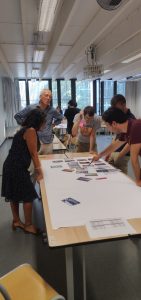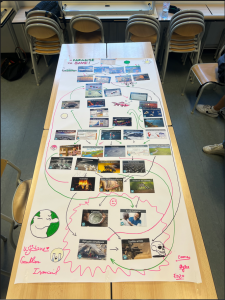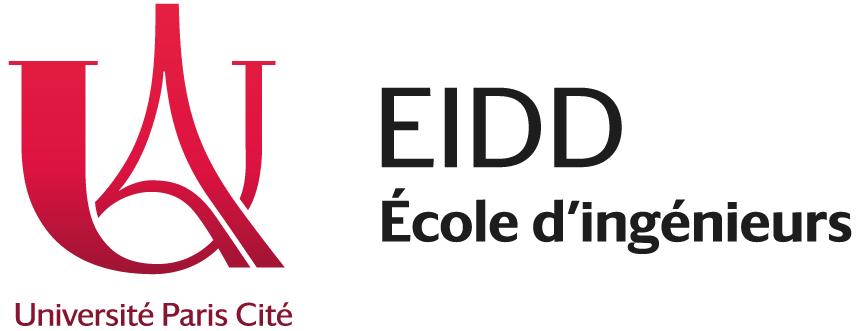 EIDD has just successfully held its first workshop «Fresque du Climat», on Thursday 7 September.
EIDD has just successfully held its first workshop «Fresque du Climat», on Thursday 7 September.
As part of the training in social and environmental responsibility of its students, the EIDD engineering school has integrated since this year the animation of a workshop «Fresque du Climat» for all its neo-entrants students in the engineering cycle. Through this workshop, EIDD students are sensitized in a playful and scientific way to the major global climate issues to help trigger, at the earliest, the necessary changes to preserve the planet and life in all its biodiversity. Supported by the Engineers Without Borders Association (ISF), which has an antenna at the EIDD, and by the school management, teaching and administrative staff, and some EIDD students first trained and then supervised 10 gaming tables. Colleagues from other components also participated in the facilitation of the groups, expressing their support for this EIDD initiative.
About forty maps illustrated and informed from the successive IPCC reports were distributed to students who had to classify them in order of causality starting from human activities and their consequences on the increase of the greenhouse effect until a multitude of disturbances such as the water cycle. Once the cards were placed, moved and replaced, each group had to illustrate its fresco, connect the cards between them, explain its choices and title the fresco. At the end, everyone was asked about their feelings and their positioning in relation to the rapid and necessary start of all before proposing collaborative avenues for reflection. The free exchanges within each group revealed the already advanced awareness of engineering students and the integration for some of them of this awareness to their professional project.
 Here is the testimony of Louis Waquier, PhD student at the Materials and Quantum Phenomena laboratory, leader of a group of «frescoers»:
Here is the testimony of Louis Waquier, PhD student at the Materials and Quantum Phenomena laboratory, leader of a group of «frescoers»:
“When I asked them at the beginning of the workshop, they were all shy and I realized that for the majority of them climate change was not even a topic. And by questioning them again at the end, they were debating among themselves and ideas were coming out, the seeds of awareness seemed to have been planted in the majority of them (I hope). Now, for these seeds to yield trees, we must maintain them. To mature this awareness of the world that awaits us tomorrow and of which they will be actors, they must be confronted with these issues throughout their schooling.
 At the end of the workshop, I also felt them very helpless. This is the problem of the fresco, 3 hours is enough to understand the immensity of the problem, but 3 hours are insufficient to grasp it in its entirety and consider solid solutions. To overcome this helplessness, they need the keys. How can they, as engineers, make a difference? It is our role, that of the EIDD, to give them these keys, especially through teaching. We are aware of this: teaching must adapt to this collective challenge, at the risk that students end up in cognitive dissonance at the end of their studies, often caught between technical skills that are often used to accelerate the world and environmental issues that require us to slow down.”
At the end of the workshop, I also felt them very helpless. This is the problem of the fresco, 3 hours is enough to understand the immensity of the problem, but 3 hours are insufficient to grasp it in its entirety and consider solid solutions. To overcome this helplessness, they need the keys. How can they, as engineers, make a difference? It is our role, that of the EIDD, to give them these keys, especially through teaching. We are aware of this: teaching must adapt to this collective challenge, at the risk that students end up in cognitive dissonance at the end of their studies, often caught between technical skills that are often used to accelerate the world and environmental issues that require us to slow down.”
Aware of the importance and role of education in this collective challenge, the EIDD teaching team is working to evolve its models to include more importantly issues related to the ecological transition and the sustainable development goals, under the leadership of Christophe Goupil, professor at the Interdisciplinary Laboratory of Energies of Tomorrow and scientific advisor of the Campus of Transition.
The workshop ended well with the desire of all to resume the exercise as soon as possible. Here are 70 new «frescoes» formed which are added to the million «frescoes» already formed around the world (https://fresqueduclimat.org/).
Congratulations to the first-year students of the EIDD and good cognitive at the end of their studies, often caught between acquired technical skills that are well considered!
